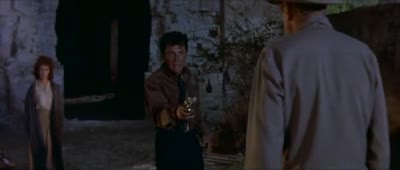Garden of Evil (1954, USA, Hathaway)
Heading out into mythical Mexico to rescue a trapped miner, Gary Cooper personifies the old-fashioned macho Stoic ideal of someone who is ready to unleash emotions or violence when appropriate, but always remains in control, unlike his too-greedy, too-angry, too-cynical friends, who are the unbalanced fragments of Cooper’s balanced whole. Susan Hayward inspires his chivalric devotion not because he doesn’t suspect he’s being played, but because that’s beside the point, when after all it is the right thing to do. Watched it all.
Salt of the Earth (1954, USA)
“The International Union of Mine, Mill and Smelter Workers present .. ” is among the top things you don’t want to see at the beginning of a film. Commie-fighters at the time thought so too, and launched a campaign against it, thus securing it eternal fame as a Blacklisted Movie. Watched: 7 minutes, right up to “I tell you, this installment plan, it’s a curse on the working man!”
Sign of the Pagan (1954, USA)
Attila the Hun looks like he has walked out of a Sword & Sorcery fantasy, and there are some great scenes where the power of Paganism and Christianity collide. But also a lot of dull, wholesome Romans. Watched: 12 minutes.

Regarding Salt of the Earth, I haven’t seen the movie, but the statement about the installment plan being a curse on the working man seems pretty prescient to me. Fifty some years after the movie was made, the working man in the USA is drowning in debt and the economy is on life support.
Debt has always been hard on poor people, (what’s new this time was that rich people and nations got in debt too, and so governments have found the motivation to save them).
On the other hand, debt is only a curse if loans are a curse. Would you rather be poor and indebted, or poor and not even have access to loans?
Question – would I rather be poor and indebted, or poor not even have access to loans:
Do I get any other choices? Way I read it, the second option leads to the first result.
Actually, in my sixty six years on Spaceship Earth I’ve been both and the first sucks worse than the second.
As for your first assertion – about what’s new this time, don’t know about that. Have to stuss on it a while. Kind of doubt it’s true though.
“Way I read it, the second option leads to the first result.”
Loans lead to debt, but debt doesn’t have to be a catastrophe. Some good things are impossible without it, like starting a business. So it’s good to at least have the choice.
Fair enough, but it doesn’t relate to the prescience of the quote – debt being the curse of the working man. It might even be argued that the curse on the working man has become the curse on the whole system.
Pingback: The best movies of 1954 « Bjørn Stærk's Max 256 Blog